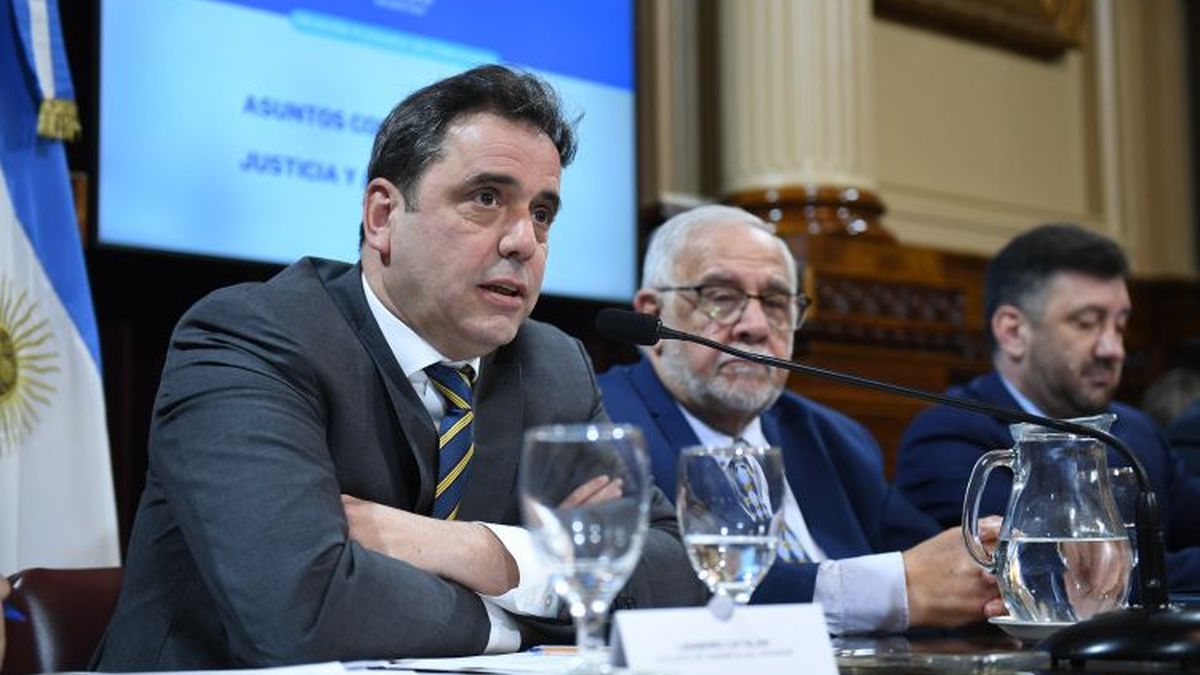He Deputy Chief of Staff of the Nation, Lisandro Catalánwas in the province of Tucumán (where he is from) for a few hours and participated in the opening ceremony of the 59th edition of Expo Ruralthe traditional show of the business sector of the countryside. Before, he met with mayors aligned with the policies of the Casa Rosada and led a meeting with 200 leaders of the still-forming party Freedom Advancesin its provincial version. Ámbito interviewed the official, where he spoke about the treatment of Budget 2025the dialogue with the governors, the view from Balcarce 50 on the governor of Tucumán, Osvaldo Jaldo, the situation of Aerolíneas Argentinas, for integrating its board of directors representing the State; and the recent approval of the Single Ballot system.
Journalist: At what point is the negotiation or dialogue with the governors, especially governors of the North Grande and now governors of the Litoral, who have just formed a bloc, on the eve of the treatment of the 2025 Budget in Congress?
Lisandro Catalan: We have ongoing dialogue with all the governors, as demonstrated by the approval of the Basic Law and the Fiscal Package, but we try to explain the country’s financial situation, what the real situation is and what our premises are in the macroeconomic order. After what President Javier Milei said in Congress last week, we are talking and explaining what our objectives are in the macroeconomic order. Also because of the cultural change that the president is proposing, which we all agree on, that is, we do not have to plan spending and then see how we get the resources by asking for foreign debt or increasing taxes. First we have to see what resources we have in order to then plan spending.
LC: The Minister of Economy, Luis Caputo, has already explained it. The US$ 60 billion is an aspiration and a goal that we must have. And one of the unshakeable pillars that the President proposes is fiscal balance. We cannot have a deficit again because the deficit in recent decades has led us to more poverty, more neglect, more social exclusion. So, we are working hard to carry out the policy that the President proposed with which he won the elections, which is to recompose the macroeconomy with the requirement of unleashing productive forces through a genuine generation of the economy, not with the issuance of money and the consequent inflation or also with the external debt mortgaging the future of the young people of Argentina. It is a process in which we are well on our way and I believe that we are going to make that cultural change as well, which will be absorbed by the governors. There are many governors with whom I am speaking who will be presenting their own budgets in the coming weeks, also with fiscal balance.
Q: When you say that adjustments must be made in the provincial governments, is that also directed at Tucumán, because Governor Osvaldo Jaldo said that the adjustment was made and there is no longer room for any type of adjustment?
LC: Each governor is responsible for his own management. As a Tucuman, I also say this, it seems to me that Tucuman understood what the Nation’s approach is, the direction that the Nation should take. And in this sense, I hope that Governor Jaldo, when presenting his 2025 Budget, does so also in order to maintain a fiscal balance and not generate expenses without knowing where he will get the resources from. My feeling, from what I see, is that this will be the case.
WhatsApp Image 2024-09-21 at 20.09.55.jpeg
Catalán’s agenda in Tucumán was intense and brief.
Q: How do you analyse the situation of Aerolíneas Argentinas, given your dual role as a member of the Cabinet and representative of the State on the company’s board of directors?
LC: Aerolíneas Argentinas is a company that has been running a very large deficit, which is paid for by all taxpayers, all Argentines. It was a model company, but through various administrations, some unions that negotiated privileges for their own benefit and not for the company were strengthened. Today, the average number of flight hours per month for Aerolíneas Argentinas pilots is much lower than in the industry worldwide. The salary level is good and has been updated more than the salaries of the various public companies.
Today (Friday morning) we were talking with the president of Aerolíneas Argentinas about some benefits that, first, are incomprehensible, they are unfair. And, second, they generate an operating deficit for the company that we all pay for. For example, the possibility for pilots, their wives and children to travel in business class to any part of the world. And if there is no space on the dates they choose, passengers who paid for the ticket have to be removed. $1,000 million are spent monthly on taxis for transfers from the employees’ homes to the company. So, today they are raising a labor dispute that is putting the company under stress.
Q: What will the Government do?
LC: He will go all out, as he is going all out with all the issues he raises, to make it an efficient, modern company without a deficit. If that is not feasible, the necessary measures will be taken. So there is only one destiny for Aerolíneas, which is to be efficient and competitive or it will not be Aerolíneas.
Q: What are your expectations for the upcoming elections, in relation to the recent implementation of the Single Paper Ballot system?
LC: I was one of those responsible for promoting the Single Paper Ballot project in the Senate, which was approved a few days ago. I think it is a revolutionary change for the Argentine electoral system. You know, especially in Tucumán, what it is like to go to vote and find 50 or 120 ballots. The Single Paper Ballot makes the electoral system transparent because it guarantees the representation of all political parties at the table. It also facilitates oversight and avoids having to permanently replace torn ballots, for example, beyond the savings that printing a single paper ballot for all political parties implies. I think it is a revolutionary change and we are going to go for it next year, at least to vote in the national categories with the Single Paper Ballot.
Q: Will there be any further changes to the electoral system?
LC: We are also promoting a more comprehensive project, a political reform like the Clean Voting Bill and the possibility of foreigners abroad voting and a law of transparency in the financing of political parties. The Electronic Ballot is a variant that is being studied but I think that this step from the Single Paper Ballot is a huge step for the Argentine political system, for Argentine democracy. Argentina today has 760 political parties, many are rubber stamps, they do not have any political representation but they all print ballots supported by the State. Many were businesses, that is, the State allocated the funds and the ballots were not printed because there was no political representation being sought. The Single Paper Ballot will put an end to that and will guarantee that all political parties are at the table.
Q: Why did you meet with the mayors of Yerba Buena (UCR), Concepción (UCR) and Alderetes (PJ)?
LC: We signed an agreement that is a program of the Secretariat of Public Innovation called Digital Points, which consists of a digital kit worth about $70 million, made up of digital tools for training, especially for children and the elderly, because older people are also given tools and training courses. Today we signed with four municipalities (NR: due to scheduling problems, the municipality of Bella Vista was not present at the signing) and it is a source of pride for me because they are the first four municipalities in the entire country. We are going to continue moving forward in other provinces with different municipalities, but we are also going to continue moving forward in some other municipalities in Tucumán.
Q: In Tucumán, there is talk that you will lead the list of candidates for national deputies for the province in next year’s legislative elections. Is that in your plans?
LC: There is no chance that I will be a candidate and I am not thinking about it because, to be honest, I have very few minutes left in the day to think about these things because of the functions I have. I once said it in a report that if I were thinking about next year’s candidacy today I would say that they should not vote for me because I am irresponsible.
The Deputy Chief of Staff set foot on Tucuman soil at 6 pm last Friday and returned to CABA at noon on Saturday. After the obligatory speeches at the opening of the Tucuman rural exhibition and after dinner, Catalan and Jaldo They had a private chat in the gardens of the property, which lasted several minutes. From the little that transpired from that one-on-one, it was learned that the national official promised to return to Tucumán in the next few weeks to tour public works under construction.
Source: Ambito
I am Pierce Boyd, a driven and ambitious professional working in the news industry. I have been writing for 24 Hours Worlds for over five years, specializing in sports section coverage. During my tenure at the publication, I have built an impressive portfolio of articles that has earned me a reputation as an experienced journalist and content creator.




